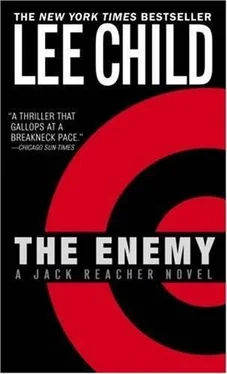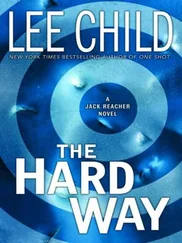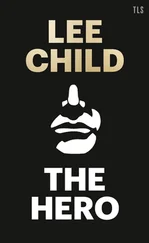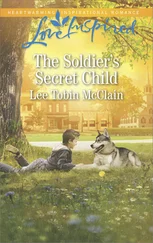Flying eastthe time zones stole back the hours we had gained going west. It was eleven o’clock at night at Washington National when we landed. I reclaimed my duffel from the carousel and we took the shuttle to the long-term lot. The Chevy was waiting there right where we left it. I used some of Franz’s fifty bucks and we filled the tank. Then Summer drove us back to Bird. She went as fast as always and took the same old route, down I-95. Past the State Police barracks, the place where the briefcase was found, the rest area, the cloverleaf, the motel, the lounge bar. We were timed in through Fort Bird’s main gate at three in the morning. The post was quiet. There was a night mist clamped down all over it. Nothing was stirring.
“Where to?” Summer said.
“The Delta station,” I said.
She drove us around to the old prison gates and the sentry let us in. We parked in their main lot. I could see Trifonov’s red Corvette in the darkness. It was all on its own, near the wall with the water hose. It looked very clean.
“Why are we here?” Summer said.
“We had a very weak case,” I said. “You made that point yourself. And you were right. It was very weak. The forensics with the staff car helped, but we never really got beyond purely circumstantial stuff. We can’t actually put Vassell and Coomer and Marshall at any of the scenes. Not definitively. We can’t prove Marshall ever actually touched the crowbar. We can’t prove he didn’t actually eat the yogurt for a snack. And we certainly can’t prove that Vassell and Coomer ever actually ordered him to do anything. If push came to shove, they could claim Marshall was an out-of-control lone wolf.”
“So?”
“We walked in and confronted two senior officers who were doubly insulated from a very weak and circumstantial case. What should have happened?”
“They should have fought it.”
I nodded. “They should have scoffed at it. They should have laughed it off. They should have gotten offended. They should have threatened and blustered. They should have thrown us out on our asses. But they didn’t do any of that. They just sat still for it. And their silence kind of pled themselves guilty. That was my impression. That’s how I took it.”
“Me too,” Summer said. “Certainly.”
“So why didn’t they fight?”
She was quiet for a spell.
“Guilty consciences?” she said.
I shook my head. “Spare me.”
She was quiet a moment longer.
“Shit,” she said. “Maybe they’re just waiting. Maybe they’re going to collapse the case in full view of everybody. In D.C., tomorrow, when they’ve got their lawyers there. To ruin our careers. To put us in our place. Maybe it’s a vindictive thing.”
I shook my head again. “What did I charge them with?”
“Conspiracy to commit homicide.”
I nodded. “I think they misunderstood me.”
“It was plain English.”
“They understood the words. But not the context. I was talking about one thing, and they thought I was talking about a different thing. They thought I was talking about something else entirely. They pled guilty to the wrong conspiracy, Summer. They pled guilty to something they know can be proved beyond a reasonable doubt.”
She said nothing.
“The agenda,” I said. “It’s still out there. They never got it back. Carbone double-crossed them. They opened the briefcase up there on I-95, and the agenda wasn’t in it. It was already gone.”
“So where is it?”
“I’ll show you where,” I said. “That’s why we came back. So you can use it tomorrow. Up in D.C. Use it to leverage all the other stuff. The things we’re weak on.”
We slid out of the car into the cold. Walked across the lot to the cell block door. Stepped inside. I could hear the sounds of sleeping men. I could taste the sour dormitory air. We walked through corridors and turned corners in the dark until we came to Carbone’s billet. It was empty and undisturbed. We stepped in and I snapped the light on. Stepped over to the bed. Reached up to the shelf. Ran my fingers along the spines of the books. Pulled out the tall thin Rolling Stones souvenir. Held it. Shook it.
A four-page conference agenda fell out on the bed.
We stared at it.
“Brubaker told him to hide it,” I said.
I picked it up and handed it to Summer. Turned the light back off and stepped out into the corridor. Came face-to-face with the young Delta sergeant with the beard and the tan. He was in skivvies and a T-shirt. He was barefoot. He had been drinking beer about four hours ago, according to the way he smelled.
“Well, well,” he said. “Look who we have here.”
I said nothing.
“You woke me up talking,” he said. “And flashing lights on and off.”
I said nothing.
He glanced into Carbone’s cell. “Revisiting the scene of the crime?”
“This isn’t where he died.”
“You know what I mean.”
Then he smiled and I saw his hands bunch into fists. I slammed him back against the wall with my left forearm. His skull hit the concrete and his eyes glazed for a second. I kept my arm hard and level across his chest. Got the point of my elbow on his right bicep and spread my open fingers across his left bicep. Pinned him to the wall. Leaned on him with all my weight. Kept on leaning until he was having trouble breathing.
“Do me a favor,” I said. “Read the newspaper every day this week.”
Then I fumbled in my jacket pocket with my free hand and found the bullet. The one he had delivered. The one with my name on it. I held it with my finger and thumb right down at the base. It shone gold in the faint night light.
“Watch this,” I said.
I showed him the bullet. Then I shoved it up his nose.
My sergeantwas at her desk. The one with the baby son. She had coffee going. I poured two mugs and carried them into my office. Summer carried the agenda, like a trophy. She took the staple out of the paper and laid the four sheets side by side on my desk.
They were original typewritten pages. Not carbons, not faxes, not photocopies. That was clear. There were handwritten notes and penciled amendments between the lines and in the margins. There were three different scripts. Mostly Kramer’s, I guessed, but Vassell’s and Coomer’s as well, almost certainly. It had been a round-robin first draft. That was clear too. It had been the subject of a lot of thought and scrutiny.
The first sheet was an analysis of the problems that Armored was facing. The integrated units, the loss of prestige. The possibility of ceding command to others. It was gloomy, but it was conventional. And it was accurate, according to the Chief of Staff.
The second page and the third page contained more or less what I had predicted to Summer. Proposed attempts to smear key opponents, with maximum use of dirty laundry. Some of the margin notes hinted at some of the dirt, and a lot of it sounded pretty interesting. I wondered how they had gathered information like that. And I wondered if anyone in JAG Corps would follow up on it. Someone probably would. Investigations were like that. They led off in all kinds of random directions.
There were ideas for public relations campaigns. Most of them were pretty limp. These guys hadn’t mixed with the public since they took the bus up the Hudson to start their plebe year at the Point. Then there were references to the big defense contractors. There were ideas for political initiatives inside the Department of the Army and in Congress. Some of the political ideas looped right back and tied in with the defense contractor references. There were hints of some pretty sophisticated relationships there. Clearly money flowed one way and favors flowed the other way. The Secretary of Defense was mentioned by name. His help was taken pretty much for granted. On one line his name was actually underlined and a note in the margin read: bought and paid for . Altogether the first three pages were full of the kind of stuff you would expect from arrogant professionals heavily invested in the status quo. It was murky and sordid and desperate, for sure. But it wasn’t anything that would send you to jail.
Читать дальше












